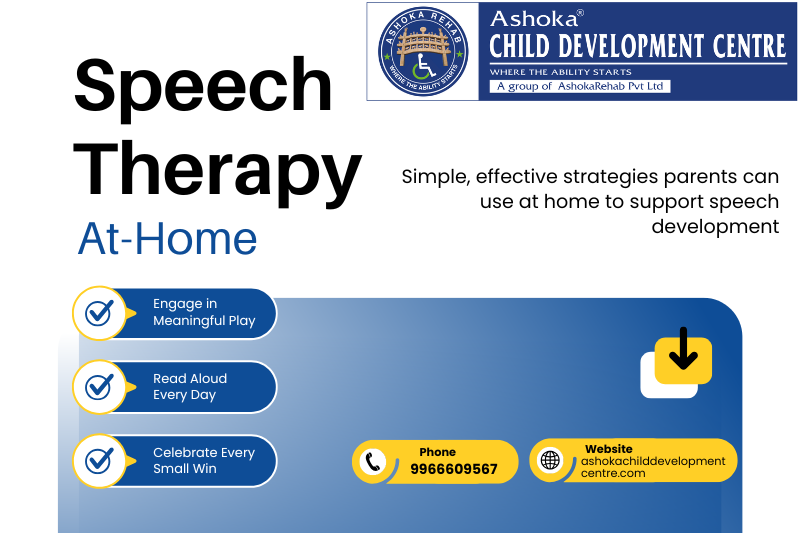At Ashoka Child Development Centre, we understand that every child’s voice is unique—and helping them express themselves clearly is at the heart of our mission. While professional speech therapy sessions are essential, what truly accelerates progress is continued support at home. That’s why we empower parents with effective, easy-to-follow strategies that complement in-clinic therapy and make a big difference in their child’s communication journey.
Whether your child is dealing with speech delays, stammering, articulation errors, or language comprehension issues, early intervention and daily engagement are key.
🧠 Understanding Speech and Language Challenges
Speech and language disorders can vary widely, and may include:
- Articulation Disorders – difficulty pronouncing certain sounds (e.g., saying “wabbit” instead of “rabbit”)
- Fluency Disorders – like stammering or stuttering
- Language Delays – difficulty understanding or using spoken language
- Voice Disorders – abnormal pitch, loudness, or quality of voice
Our speech-language pathologists (SLPs) at Ashoka Child Development Centre create individualized therapy plans, but the impact is multiplied when therapy extends into the child’s natural environment—home.
🏠 Top 10 Home-Based Speech Therapy Tips for Parents
Here are simple, effective strategies parents can use at home to support speech development:
1. Make Speech Part of Your Daily Routine
Use daily moments like brushing teeth, bathing, or snack time to practice simple words and phrases. Repetition in these natural settings helps children learn faster.
2. Engage in Meaningful Play
Playtime is a powerful learning moment. Use blocks, dolls, or toy animals to model words like go, up, eat, sleep, and name the items you’re using.
3. Use Visual Cues
Flashcards, books with pictures, or charts help kids associate objects with words. Visual learning can significantly boost vocabulary development.
4. Talk Slowly and Clearly
Modeling slow, clear speech helps your child process and imitate sounds more accurately. Avoid baby talk—speak to them the way you want them to speak.
5. Ask Open-Ended Questions
Instead of asking yes/no questions, try: “What do you want to eat?” or “Tell me what you see in this picture.” This encourages expressive language.
6. Read Aloud Every Day
Reading books together builds vocabulary, sentence structure, and imagination. Pause occasionally and ask your child to describe what’s on the page.
7. Follow Their Lead
Let your child choose the toy or activity. When they’re engaged, they’re more likely to communicate. You can build language naturally around what interests them.
8. Keep it Short and Sweet
Aim for 15–20 minutes sessions. Frequent, short practices are more effective than long sessions that might overwhelm or tire your child.
9. Celebrate Every Small Win
Praise every effort your child makes—even if it’s just a sound or attempt. Positive reinforcement keeps them motivated and confident.
10. Stay Consistent and Patient
Progress in speech therapy is gradual. Stay consistent with home practice and celebrate improvements, no matter how small they may seem.
👨⚕️ Why Professional Support Still Matters
While home practice is invaluable, it works best when guided by a certified SLP. At Ashoka Child Development Centre, our therapists:
- Assess your child’s speech and language development
- Identify specific areas of concern
- Design customized therapy plans
- Train parents to carry out targeted exercises at home
The combination of expert guidance and home involvement results in faster, more sustainable improvements.
🌟 Let’s Build Their Voice Together
If you’re looking for the best speech therapy in Hyderabad, look no further than Ashoka Child Development Centre. With a blend of professional care and home-based support, we help children overcome their speech challenges and grow into confident communicators.


Pingback: Different Types of Speech and Language Disorders - ashokachilddevelopmentcentre.com